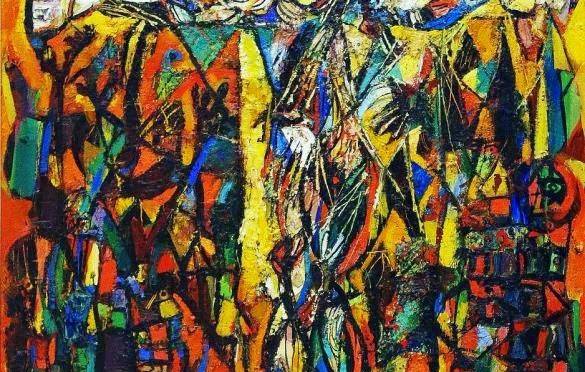**sermon art: Crucifixion in Yellow by Abraham Rattner (1953)
Caitlin Trussell with Augustana Lutheran Church on May 5, 2024
[sermon begins after the Bible reading]
John 15:9-17 [Jesus said to his disciples:] 9“As the Father has loved me, so I have loved you; abide in my love. 10If you keep my commandments, you will abide in my love, just as I have kept my Father’s commandments and abide in his love. 11I have said these things to you so that my joy may be in you, and that your joy may be complete.
12“This is my commandment, that you love one another as I have loved you. 13No one has greater love than this, to lay down one’s life for one’s friends. 14You are my friends if you do what I command you. 15I do not call you servants any longer, because the servant does not know what the master is doing; but I have called you friends, because I have made known to you everything that I have heard from my Father. 16You did not choose me but I chose you. And I appointed you to go and bear fruit, fruit that will last, so that the Father will give you whatever you ask him in my name. 17I am giving you these commands so that you may love one another.”
[sermon begins]
Friends make life fun, and challenging, and good, and funny, and frustrating, and great. Friends can be around for the long haul or sometimes only for a particular season of life. Some people are inclined to talk about close friends as besties. Others simply let each friend defy description and hierarchy. Most people would say that friends are essential. We could argue that Jesus thought that friends were essential, too. Jesus said to his disciples, “I do not call you servants any longer, because the servant does not know what the master is doing; but I have called you friends, because I have made known to you everything that I have heard from my Father; you did not choose me, but I chose you.”[1] No longer servants. Friends. That’s astounding for Jesus to say. And it’s a particular friendship. Jesus defines it. The disciples are Jesus’ friends because they’re in the know about God.
Jesus shared with them what he heard from God the Father. Bam. Friends! Friendship connected with God means something. It means something holy because God is the source of holiness and when we say something is holy, we mean it is something touched by God – whether that’s a person, thing, time, or place.[2] Holiness is not limited to the church. Of course, God is not restricted by such feeble constraints. Bible story after Bible story remind us that God acts where God will and with who God wills, not only in the places or people we think God should be acting. But when Jesus connected friendship and God, he was talking about holy friendship of a particular kind. It’s a good day to talk about what that means for being church because Jesus taught what it means in our reading today.
His teaching is part of what’s called the Farewell Discourse in the Gospel of John, chapters 14-17. Jesus talked about what holy friendship means as he said farewell to his friends. He knew they would need that connection to sustain their witness as their day-to-day world became more challenging after his death. As they longed to have Jesus back with them, they would need to turn towards each other in the love of holy friendship with the deep conviction that their lives belonged first to God and by extension they belonged to each other.
Jesus made holy friendship simple. Not easy. Simple. Lives shared in the witness of Jesus’ good news means the love of God is at its core. Jesus revealed God’s love in his life, ministry, death, and resurrection. Holy friendship includes sharing Jesus’ ways with each other, being Jesus to each other. We preach Christ crucified and we are the resurrected body of Christ in the world. This means that suffering doesn’t have the last word. Love does.
In the simplest of terms, Jesus showed up for milestones like a wedding and a funeral.[3] Pausing to observe life’s moments with holy friends recognizes God’s promise of presence with us in every situation, good or ill. Last Sunday in worship, we celebrated with our young holy friends graduating from high school. Lifting them in prayer during their time of transition. This coming Wednesday, 60+ Ministry will worship together and eat lunch afterwards. In one day last week, I met with three sets of holy friends – parents planning a baptism, another family planning a funeral, and a couple planning their wedding. (My first hat trick as a pastor.[4]) What do these things have in common? God is in the middle of these events with God’s promises of faith, hope, and love through celebration and suffering. Showing up for each other’s milestones builds community through the bonds of holy friendship, belonging to each other in the name of Jesus.
Right after the wedding of Cana in John chapter 2, where Jesus performed his miracle of turning water into wine, we’re invited into a different story. Jesus cleared the temple of bad business practices that hurt people and worked against the community.[5] The story of Jesus’ anger and how we think about the church helps us tend to the business of the church without turning the church solely into a business. Fiscal responsibility and attending to the business of the church is worthy, it’s just not the only or last word. Jesus’ teaching about holy friendship adds to that nuance. Stewarding our resources for both the good of this faith community and the wider community forms a tension from which we witness to Christ’s love for us and for the world. Our holy friendship as stewards isn’t easy. We have different ideas about how best to use the money, time, and talents that God first gave us.
Last week, Pastor Gail preached about Peter’s redemption and transformation after the resurrection in John, chapter 21.[6] In his fear during Jesus’ trial, Peter denied knowing Jesus three times. After the resurrection, Jesus asked Peter three times if he loved him. Each time, Peter said, “Yes, Lord, I love you.” That scripture, Peter’s longing for Jesus to hear him, wrecks me every time. Three denials. Three affirmations of love and a way to make amends as Jesus told Peter to feed his sheep, to tend to the beloved people who belong to God and each other. Grace upon grace was bestowed on Peter in those moments. If Peter’s example is too lofty, let’s visit the woman caught in adultery in John, chapter 8.[7] She was a dead woman walking, about to be legally executed by stoning. Jesus wielded reckless grace on her behalf while inviting the men around her into self-examination of their own sin. He said to them, “Let anyone among you who is without sin be the first to throw a stone at her.” With that grace-filled challenge, is any wonder that Jesus ended up executed himself?
We follow the example of Jesus in our life together. In our best moments, we love each other across healthy boundaries for our common good. Do we sometimes hurt each other by the things we do and the things we leave undone? You bet. Directly addressing hurt and shame with the people who hurt us is what holy friendship looks like. We as the church get to practice Jesus’ teaching over and over again. Holy conversations follow the example of Jesus’ conversations with Nicodemus in John chapter 3 and the woman at the well in John chapter 4. Holy conversations that name both how we are hurt and how we hurt others are a call to grace. Grace upon grace to know ourselves, too. To laugh at ourselves, shake our heads at ourselves, and open ourselves to something inside of us shifting by way of that grace so that we can better love each other, including loving our very own selves. That’s holy friendship, figuring out how to extend grace to each other because we are holy friends, yoked to Jesus by Jesus for each other.
We belong to each other through no work of our own as we do the work of belonging to each other. Jesus said, “…you did not choose me, but I chose you.” Through our baptisms by water, into Christ’s death and resurrection, the Holy Spirit works the wonders of transformation, giving us spiritual gifts for building up the body of Christ as a place of reckless belonging, a place of imperfect, holy friendship for God’s sake, for our sake, and for the sake of the world. Amen.
_____________________________________
[1] John 15:15-16a
[2] Frederick Buechner, “Holy” in Wishful Thinking (New York: Harper Collins Publishers, 1973, 1993), 45.
[3] John 2: Jesus first miracle of turning water into wine at the Wedding of Cana; John 11: The raising of Lazarus.
[4] A hat trick is a sports term that applies to achievements that happen in groups of three like a hockey player who scores three points in one game.
[5] John 2:13-25
[6] John 21:15-19
[7] John 8:1-11


![Who has been Jesus for you? John 3:14-21 [OR Would Someone Please Put John 3:17 on the Poster, Too?]](https://caitlintrussell.org/wp-content/uploads/2024/03/Luke-Allsbrook-Jesus-Washes-the-Disciples-Feet.-2018-oil-on-canvas--672x372.jpg)
![Brown Bear, Brown Bear, What Do You See? [OR Hope Flickering in the Darkness] John 3:14-21 and Numbers 21:4-9](https://caitlintrussell.org/wp-content/uploads/2021/03/brown-bear-brown-bear-what-do-you-see-672x372.jpg)
![Faithful Debate to Challenge Assumptions [OR Rabbinic Machloket L’shem Shemayim/Disagreement for the Sake of Heaven]](https://caitlintrussell.org/wp-content/uploads/2020/03/Henry_Ossawa_Tanner_-_Jesus_and_nicodemus-on-the-rooftop-1899-672x372.jpg)

